
Author: Sherman Alexie
Publisher: Little Brown Books for Young Readers, Reprint Edition April 1, 2009
Lexile Measure: 600L
Classification: Fiction
Summary:
This novel, which won a National Book Award for Young People’s Literature, is no stranger to controversy. The American Library Association lists it as one of the most frequently challenged books in 2013, 2012, 2011, and 2010. Despite the controversy that follows it, educators praise the book for its message and its engaging tone and personable narrator in the character of Arnold (“Junior”), a teenager growing up on the Spokane Indian reservation.
Publisher: Little Brown Books for Young Readers, Reprint Edition April 1, 2009
Lexile Measure: 600L
Classification: Fiction
Summary:
This novel, which won a National Book Award for Young People’s Literature, is no stranger to controversy. The American Library Association lists it as one of the most frequently challenged books in 2013, 2012, 2011, and 2010. Despite the controversy that follows it, educators praise the book for its message and its engaging tone and personable narrator in the character of Arnold (“Junior”), a teenager growing up on the Spokane Indian reservation.
|
|
Language:
The Absolutely True Diary of a Part-Time Indian is told from Arnold’s point of view. He uses profanity in his narration, and he quotes others who use profanity. Between the two, they use it a lot. Arnold never uses it towards others. Profanity includes: b*stard (p. 3) r*tard (p. 4) *ss (p. 7, 44, 48, 49, 72, 115, 116, 124, 130, 131, 157) s*cks (p. 13, 122, 143) cr*p (p. 19, 28, 143, 159) b*stards (p. 21, 22) *sshole (p. 21, 176) sh*t (p. 40, 56, 65, 75) Jesus (p. 75) oh my God (p. 80, 93, 122, 129) d*ck (p. 93) the “N” word (p. 64) p*ss (p. 109) f*ck (p. 64) p*ssy (p. 51) f*ck (p. 52) d*mn (p. 129) Drug and Alcohol Use: Alcohol use and abuse is one of the major themes of this book.
Violence and Crime:
Sexual Content: Arnold is a teenage boy, and his diary has lots of sexual references but little sex.
Other:
Other Helpful Reviews:
|